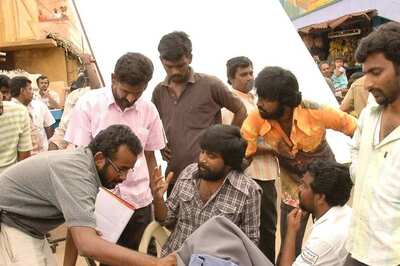
views
Beijing: German Chancellor Angela Merkel said on Monday that she and Chinese President Hu Jintao agreed during talks that Iran must not have nuclear weapons or proliferate weapons of mass destruction.
But Merkel, speaking after meeting with Hu, didn't say whether the two sides discussed possible sanctions on Tehran, which Germany supports and Beijing opposes.
China, a permanent UN Security Council member, and a bloc of European countries, including Germany, are at odds over how to get Tehran to give up its nuclear program.
"We spoke in great detail about the possibilities of a diplomatic solution for Iran, that the conflict should be resolved by diplomatic means and Iran must not have nuclear weapons," Merkel said.
"We want to direct the efforts of the (international) community more strongly toward reaching this aim," she said.
After meeting earlier with Premier Wen Jiabao, Merkel said they agreed Iran "shouldn't proliferate weapons of mass destruction."
When asked about China's compliance with combatting piracy of intellectual property - an area of concern for Germany - Wen responded, "We've made a lot of efforts, but on intellectual property rights we still face many problems."
The German leader said she and Wen also discussed human rights, which she called "an important issue of bilateral dialogue."
"I think in future meetings we will continue to talk about this issue," she said.
Merkel is leading a 40-member trade delegation that includes business executives and German Economy Minister Michael Glos and Transport Minister Wolfgang Tiefensee.
The two governments signed a memorandum of understanding to cooperate in establishing high-speed railway transport in China, but there was no indication of whether Beijing planned to buy more German technology for magnetic-levitation railways.
China announced in March that it would add a 175-kilometer (110-mile) line to the nearby city of Hangzhou at a cost of 35 billion yuan (US$4.3 billion; euro3.5 billion), but hasn't said what role foreign contractors might play.
On Tuesday, Merkel is scheduled to ride the world's only commercially operating maglev rail line in Shanghai, built by a German consortium that included Thyssenkrupp AG and Siemens AG.
Merkel will also meet with a Shanghai bishop to focus on religious freedom under the country's communist leadership.
Bishop Jin was imprisoned for 27 years after the Communist takeover but was rehabilitated after the death of Mao Zedong in 1976.
He belongs to the state-sanctioned Catholic church, but is pushing for China to develop stronger ties with the Vatican.
After coming to power in 1949, the Communists set up a state-backed Catholic church outside the Vatican's authority, forcing Catholics to divide their loyalties.



















Comments
0 comment